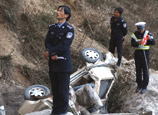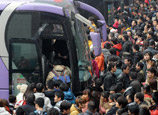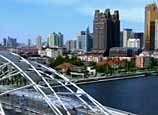
BEIJING, Feb. 6 (Xinhua) -- China's policy that exempts cars from road tolls during holiday periods will face an unprecedented test in the Spring Festival travel rush, the world's largest annual migration.
The country's 260 million licensed drivers will be exempt from the highway tolls as they go home to be reunited with their families.
The free-pass policy will see a 70 percent increase in traffic flow during the Spring Festival holiday from Feb. 9 to 15, highway authorities estimate.
The policy begins at 12 a.m. on Feb. 9 and ends at 11 p.m. on Feb. 15.
In early August, the State Council, China's Cabinet, approved a plan to lift road tolls on highways for passenger cars during major Chinese holidays.
Passenger cars with seven seats or fewer and motorcycles will not be charged on toll roads, bridges and tunnels during the Spring Festival, Tomb Sweeping Day, Labor Day and National Day, said a notice issued by the State Council on Aug. 2.
In the early 1980s, the Chinese government issued the "building highways with loans" policy to finance highway construction. Tolls have become the major source of revenue for repaying loans.
The free-pass policy has been welcomed by many private car owners as it cuts the cost of their travel.
More than 189 million car owners enjoyed the policy during the National Day holiday from Sept. 30 to Oct. 7, in 2012.
However, many were annoyed after being stuck in traffic jams on highways.
Motorists posted photos online, with one showing a motorist using a telescope to look at how long the queue was, and another showing passengers playing tennis on a traffic-jammed road.
Drawing lessons from the last holiday, some local government traffic authorities have issued detailed and improved implementation measures to ease congestion on some major travel peak days.
In south China's Guangxi Zhuang Autonomous Region, highway management authorities will issue tickets for private cars 12 hours before the cutoff time of the free-pass policy.
This is expected to ease intensive traffic flow before the policy ends, and lead to less tension among drivers, said the regional department of transportation.
However, there could be problems ahead.
China has not set up a complete transportation information collection system encompassing the highway, railway, aviation and shipping sectors.
The lack of this system makes it difficult for government authorities to evaluate and resolve traffic pressures.
Also, recent weather such as haze, snow and freezing rain may cause problems.
"A more flexible and details-concerned policy will receive more applause by Chinese people on their most cherished annual holiday," said Chen Yiyang, who is about to travel from Beijing to central China's Anhui Province.
"The extended free-toll policy is welcomed. Of course, a permanent free highway would be even better," said Chen.
















 Moments that melt your heart during the Spring Festival travel rush
Moments that melt your heart during the Spring Festival travel rush


![]()
